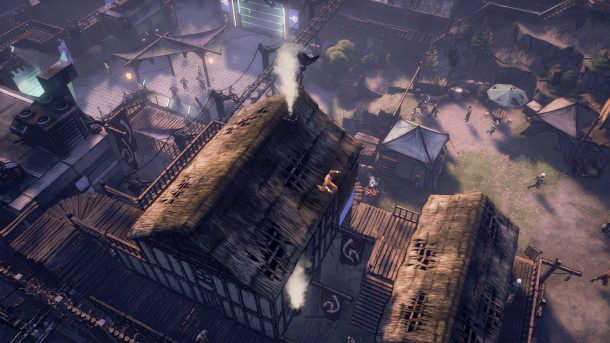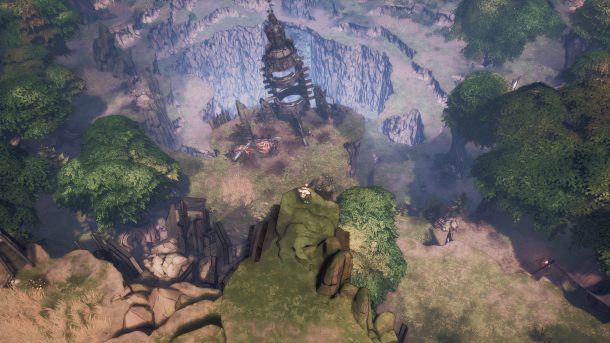Isometric RPGs have been having a bit of a renaissance lately. Games like Pillars of Eternity and Divinity: Original Sin have breathed new life into the genre that hit it big with Baldur’s Gate nearly 20 years ago. Seven: The Days Long Gone from Polish developer Fool’s Theory, which includes several ex-The Witcher 3 staff, and publisher IMGN.Pro takes the established conventions of the genre and builds on them in a big way.
While most RPGs with a top-down isometric view keep control of the character planted firmly on the ground, Seven takes inspiration more from the original Thief and adds a layer of verticality to the formula with the ability to jump and climb and crawl through the open-world environments. Within the first minutes of my demo from IMGN.Pro co-owner Bartosz Moskala at PAX East I had leaped over a guarded checkpoint to a village entrance. It was a refreshing change from the hallmark “you need to get permission to enter” that so many similar games begin with.
I had total free reign of exploring the world in the demo, and not just through the jumping and climbing around the cel-shaded, Unreal Engine 4-powered world. Shortly after arriving in the village, I accidentally killed someone I needed to talk to for a quest.

Combat is completely real-time, and an accidental button press made my fists fly. Moskala assured me that freedom would persist the entire game, I could even cut myself off from main quests if I managed to, but there would be consequences and benefits for every choice.
As if to prove that point, after talking to another villager, I met someone I’d saved from a beating earlier who then provided me with a way to finish the quest I’d fumbled with my mistaken murder.
Seven does share the pseudo-medieval fantasy setting of its forebears, sort of. The society is at a level roughly equivalent to our Middle Ages, but that’s after a thousand years of rebuilding from an apocalypse that destroyed a technologically advanced society. There are the typical village guards, there are religious zealots, and swords and axes. But the guards are “Technomages,” one of two main factions in the world, and wear futuristic riot gear, the zealots preach against certain technology as heresy, and the swords and axes are laser swords and laser axes.

That’s the setting of the demo, which is also the beginning of the game. I played as Teriel, a thief, and that’s a definite. Unlike many other games of this style, there’s no character creation. Moskala said they wanted to make players be a thief to better fit with the climbing and traversal mechanics. Prowling on rooftops and sneaking over fences is only fitting that way.
Teriel is also in the fairly unique circumstance of being bound by a demon. Like the real Middle Ages, people are fearful of such things to the point of lethal persecution. Rather than being a magic sprit from hell, though, this demon, Artanak, is actually an artificial intelligence, a remnant of the lost world’s advanced technology, and is effectively installed in Teriel’s head instead of possessing his soul. Neither are particularly happy with the deal, and Moskala said their connection, which also grants Teriel unique abilities like seeing which direction guards are looking, would be the driving force behind discovering how the old world ended, how the current Vetrall Empire rose, and how the factions, the aforementioned Technomages and the part-church part-medical research cult the Biomancers are involved.
Seven has been one of the coolest games I’ve seen at PAX East so far. I’ve been a big fan of isometric RPGs for years, and the unique combination of traditional RPG mechanics and the smooth and intuitive climbing adds a whole new layer of depth.
Moskala said they’re still working on the game and want to make it as best they can, so they haven’t set a release date yet. Whenever it comes out, it’ll be on PC for sure, and Moskala said they’re considering releasing on consoles as well.

![[PAX East 2016] Seven: The Days Long Gone Preview: Ex-Witcher devs leap over RPG roots](https://www.sidequesting.com/wp-content/uploads/SEVEN-COVER.png)
No Comments